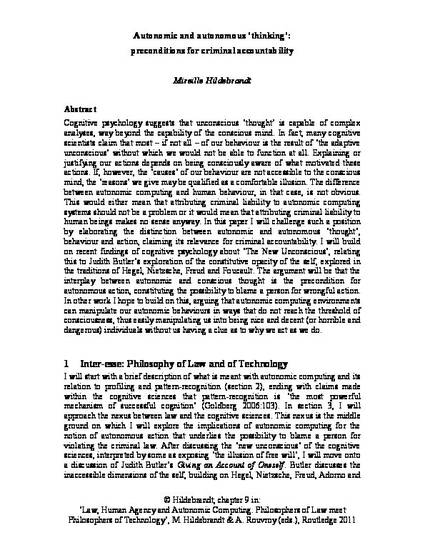
Contribution to Book
Autonomic and autonomous ‘thinking’: preconditions for criminal accountability
Law, Human Agency and Autonomic Computing The Philosophy of Law Meets the Philosophy of Technology
(2011)
Abstract
Cognitive psychology suggests that unconscious ‘thought’ is capable of complex analyses, way beyond the capability of the conscious mind. In fact, many cognitive scientists claim that most – if not all – of our behaviour is the result of ‘the adaptive unconscious’ without which we would not be able to function at all. Explaining or justifying our actions depends on being consciously aware of what motivated these actions. If, however, the ‘causes’ of our behaviour are not accessible to the conscious mind, the ‘reasons’ we give may be qualified as a comfortable illusion. The difference between autonomic computing and human behaviour, in that case, is not obvious. This would either mean that attributing criminal liability to autonomic computing systems should not be a problem or it would mean that attributing criminal liability to human beings makes no sense anyway. In this paper I will challenge such a position by elaborating the distinction between autonomic and autonomous ‘thought’, behaviour and action, claiming its relevance for criminal accountability. I will build on recent findings of cognitive psychology about ‘The New Unconscious’, relating this to Judith Butler’s exploration of the constitutive opacity of the self, explored in the traditions of Hegel, Nietzsche, Freud and Foucault. The argument will be that the interplay between autonomic and conscious thought is the precondition for autonomous action, constituting the possibility to blame a person for wrongful action. In other work I hope to build on this, arguing that autonomic computing environments can manipulate our autonomic behaviours in ways that do not reach the threshold of consciousness, thus easily manipulating us into being nice and decent (or horrible and dangerous) individuals without us having a clue as to why we act as we do.
Keywords
- human autonomy,
- autonomic computing,
- automation,
- responsibility,
- philosophy of mind
Disciplines
- Philosophy and
- Law
Publication Date
2011
Editor
M.Hildebrandt and A. Rouvroy
Publisher
Routledge
Citation Information
preprint version of the chapter, please check the chapter before citing:
https://www.routledge.com/Law-Human-Agency-and-Autonomic-Computing-The-Philosophy-of-Law-Meets/Hildebrandt-Rouvroy/p/book/9780415593236
cite as:
M. Hildebrandt, Autonomic and autonomous ‘thinking’: preconditions for criminal accountability, in: M. Hildebrandt and A. Rouvroy (eds.), Law, Human Agency and Autonomic Computing The Philosophy of Law Meets the Philosophy of Technology, Abingdon: Routledge 2011, p. 141-160
